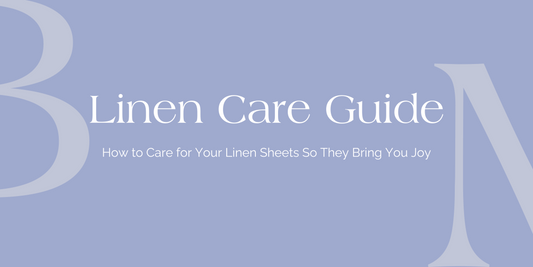
Are You Sleeping on the Wrong Sheets?
Share
Ever wondered if your bedding is secretly plotting against you? With over 31 million Americans wrestling with eczema, the "innocent" sheets you snooze on might play a bigger role than you think. Whether it's linen, cotton, polyester, or percale, each fabric brings its own drama to the bedroom. Let’s unfold the secrets behind these popular fabric choices and see which ones might actually help you sleep better.
Antibacterial Smackdown
Oh, cotton. Soft, fluffy, but a bit of a germ hoarder. It doesn’t have any superpowers against bacteria, so if it gets damp, watch out. It could turn into a microbiome fiesta. Regular laundry dates are a must to keep things sanitary.
Linen is like that clean friend who never gets sick. Made from flax, linen naturally fights off bacteria and fungi. It’s the bedding equivalent of having a superhero guard your sleep. Fresh, clean, and low maintenance, linen might just be your bed's best friend.
Polyester, the athlete of fabrics, polyester is all about wicking moisture but, sadly, it's also pretty good at holding onto odors and bacteria. Think of it as that gym bag you forgot to clean out. Effective but occasionally stinky.
Percale, this is more about the weave than the material itself. Whether it’s spun from cotton or polyester, percale is the cool, crisp type. No inherent antibacterial properties here, but its luxe, airy feel can be quite seductive.
Hypoallergenic Heroes
Cotton: Gentle on the skin but a playground for dust mites if you don’t keep it clean. Cotton needs care and frequent washes to keep allergens at bay. But it’s so cozy, we forgive it for being high maintenance.
Linen: Again, linen for the win! It doesn’t just fight germs; it also repels dust mites and mold. For allergy sufferers, linen is like having a knight in shining armor. Plus, it gets softer with every wash—how’s that for aging gracefully?
Polyester: Not the best for sensitive souls. Polyester's breathability issues mean it can make allergies worse, trapping moisture and allergens right where you breathe. It’s durable, yes, but maybe too tough for its own good.
Percale: Whether it's made from hypoallergenic-friendly cotton or less-breathable polyester will dictate how your skin reacts. Cotton percale is airy and less likely to cause issues, whereas polyester might leave you itchy.
The Sheet Showdown
Choosing the right fabric isn't just a practical decision—it's a health decision. Linen emerges as the clean and cozy champion, especially for those with sensitive skin or allergies. Cotton is the high-maintenance friend—lovable but needy. Polyester, the durable one, might need to step up its game for the allergy-prone. And percale? It’s all about who it hangs with (cotton or polyester) to really shine.
Before you drift off tonight, consider what's wrapped around you. Is it time to ditch the old threads for something more skin-friendly and clean? Opt for linens that do more than just dress up your bed—they protect and pamper you and your loved ones.
Antibacterial Smackdown
Oh, cotton. Soft, fluffy, but a bit of a germ hoarder. It doesn’t have any superpowers against bacteria, so if it gets damp, watch out. It could turn into a microbiome fiesta. Regular laundry dates are a must to keep things sanitary.
Linen is like that clean friend who never gets sick. Made from flax, linen naturally fights off bacteria and fungi. It’s the bedding equivalent of having a superhero guard your sleep. Fresh, clean, and low maintenance, linen might just be your bed's best friend.
Polyester, the athlete of fabrics, polyester is all about wicking moisture but, sadly, it's also pretty good at holding onto odors and bacteria. Think of it as that gym bag you forgot to clean out. Effective but occasionally stinky.
Percale, this is more about the weave than the material itself. Whether it’s spun from cotton or polyester, percale is the cool, crisp type. No inherent antibacterial properties here, but its luxe, airy feel can be quite seductive.
Hypoallergenic Heroes
Cotton: Gentle on the skin but a playground for dust mites if you don’t keep it clean. Cotton needs care and frequent washes to keep allergens at bay. But it’s so cozy, we forgive it for being high maintenance.
Linen: Again, linen for the win! It doesn’t just fight germs; it also repels dust mites and mold. For allergy sufferers, linen is like having a knight in shining armor. Plus, it gets softer with every wash—how’s that for aging gracefully?
Polyester: Not the best for sensitive souls. Polyester's breathability issues mean it can make allergies worse, trapping moisture and allergens right where you breathe. It’s durable, yes, but maybe too tough for its own good.
Percale: Whether it's made from hypoallergenic-friendly cotton or less-breathable polyester will dictate how your skin reacts. Cotton percale is airy and less likely to cause issues, whereas polyester might leave you itchy.
The Sheet Showdown
Choosing the right fabric isn't just a practical decision—it's a health decision. Linen emerges as the clean and cozy champion, especially for those with sensitive skin or allergies. Cotton is the high-maintenance friend—lovable but needy. Polyester, the durable one, might need to step up its game for the allergy-prone. And percale? It’s all about who it hangs with (cotton or polyester) to really shine.
Before you drift off tonight, consider what's wrapped around you. Is it time to ditch the old threads for something more skin-friendly and clean? Opt for linens that do more than just dress up your bed—they protect and pamper you and your loved ones.



